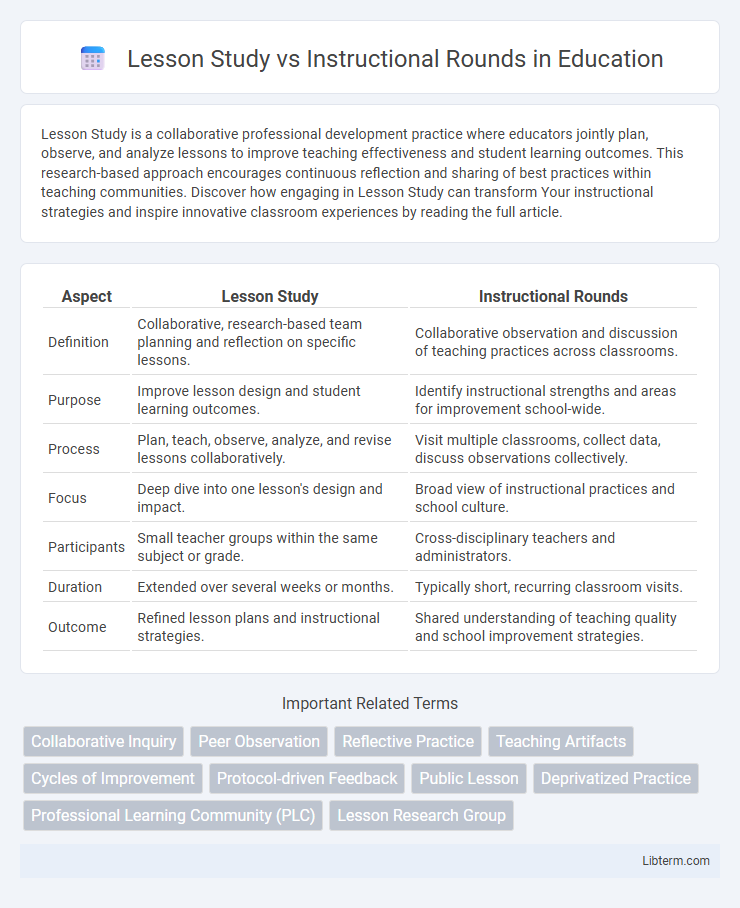Lesson Study is a collaborative professional development practice where educators jointly plan, observe, and analyze lessons to improve teaching effectiveness and student learning outcomes. This research-based approach encourages continuous reflection and sharing of best practices within teaching communities. Discover how engaging in Lesson Study can transform Your instructional strategies and inspire innovative classroom experiences by reading the full article.
Table of Comparison
| Aspect | Lesson Study | Instructional Rounds |
|---|---|---|
| Definition | Collaborative, research-based team planning and reflection on specific lessons. | Collaborative observation and discussion of teaching practices across classrooms. |
| Purpose | Improve lesson design and student learning outcomes. | Identify instructional strengths and areas for improvement school-wide. |
| Process | Plan, teach, observe, analyze, and revise lessons collaboratively. | Visit multiple classrooms, collect data, discuss observations collectively. |
| Focus | Deep dive into one lesson's design and impact. | Broad view of instructional practices and school culture. |
| Participants | Small teacher groups within the same subject or grade. | Cross-disciplinary teachers and administrators. |
| Duration | Extended over several weeks or months. | Typically short, recurring classroom visits. |
| Outcome | Refined lesson plans and instructional strategies. | Shared understanding of teaching quality and school improvement strategies. |
Defining Lesson Study: A Collaborative Approach
Lesson Study is a collaborative approach where educators work together to plan, observe, and analyze teaching practices to improve student learning outcomes. This method emphasizes continuous professional development through cycles of focused lesson planning, classroom observation, and reflective discussions among teachers. Unlike Instructional Rounds, which involve administrators and focus on school-wide instructional improvement, Lesson Study centers primarily on peer collaboration within teaching teams to refine specific lessons.
Understanding Instructional Rounds: Key Features
Instructional Rounds involve educators collaboratively observing classroom teaching to identify patterns and challenges in instructional practices, emphasizing real-time feedback and continuous improvement. Key features include structured observation cycles, focus on specific instructional problems, and reflective discussions aimed at enhancing student learning outcomes. This approach draws from medical rounds, fostering a culture of trust and analytical dialogue among educators to promote evidence-based instructional changes.
Historical Background of Both Practices
Lesson Study originated in Japan during the late 19th century as a collaborative teacher development process aimed at improving instructional methods through repeated cycles of planning, observing, and refining lessons. Instructional Rounds emerged in the early 2000s, inspired by medical rounds in hospitals, adapting this concept to education for systematic classroom observations and collective problem-solving among educators. Both practices share roots in promoting reflective teaching and professional learning communities but evolved independently within distinct cultural and institutional contexts.
Main Objectives: Lesson Study vs Instructional Rounds
Lesson Study aims to collaboratively improve teaching practices through detailed lesson planning, observation, and reflection among educators within the same school or grade level. Instructional Rounds focus on identifying effective teaching strategies and common instructional challenges by having groups of educators observe multiple classrooms across different schools, promoting system-wide instructional improvement. Both methodologies emphasize professional development but differ in scale and purpose, with Lesson Study centered on lesson refinement and Instructional Rounds geared towards broader instructional leadership and shared expertise.
Step-by-Step Process Comparison
Lesson Study involves collaborative planning, observing, and analyzing a single lesson to improve teaching practices through detailed feedback and reflection, typically conducted in cycles focusing on refining specific instructional strategies. Instructional Rounds consist of teams visiting multiple classrooms to observe teaching practices, collect evidence on instructional quality, and conduct debrief sessions aimed at identifying systemic patterns and shared improvement areas across a broader school or district context. Both processes emphasize collaborative teacher engagement and evidence-based reflection but differ in scope and focus, with Lesson Study centered on in-depth lesson refinement and Instructional Rounds aimed at system-wide instructional improvement.
Roles of Teachers and Facilitators
In Lesson Study, teachers actively collaborate as co-researchers to plan, observe, and reflect on lessons, while facilitators guide the process and ensure focused inquiry. Instructional Rounds involve teachers as observers and discussants analyzing practice to identify trends, with facilitators coordinating rounds and fostering productive dialogue. Both frameworks emphasize teacher agency, but Lesson Study centers on iterative lesson improvement, and Instructional Rounds prioritize diagnostic observation and shared learning.
Impact on Professional Development
Lesson Study fosters deep collaborative reflection among educators by focusing on planning, observing, and improving specific lessons, which enhances instructional techniques and content knowledge. Instructional Rounds emphasizes observational learning through group visits to classrooms, promoting shared responsibility and evidence-based discussions that drive systemic instructional improvement. Both methodologies significantly advance professional development by cultivating a culture of continuous learning, reflective practice, and collective expertise in teaching strategies.
Evidence of Effectiveness: Research Insights
Research indicates Lesson Study fosters deeper teacher collaboration by engaging educators in systematic observation, reflection, and iterative lesson refinement, leading to improvements in instructional practices and student outcomes. Instructional Rounds emphasize collective analysis of classroom practices using observational protocols that enhance shared understanding and targeted feedback, contributing to school-wide instructional improvement. Comparative studies reveal both approaches boost teacher professional growth, with Lesson Study showing stronger links to sustained pedagogical changes and Instructional Rounds promoting organizational learning through cross-classroom insights.
Challenges and Limitations
Lesson Study faces challenges such as time constraints for collaborative planning, varying teacher expertise, and difficulty in consistently aligning lessons with student needs. Instructional Rounds often encounter limitations including the risk of evaluative judgment rather than constructive observation, potential resistance from teachers, and challenges in maintaining focus on specific instructional practices. Both approaches require strong leadership and a culture of trust to overcome these obstacles effectively.
Choosing the Right Approach for Your School
Selecting the right collaborative professional development approach depends on your school's goals and culture. Lesson Study emphasizes in-depth analysis of lesson design and student learning through iterative cycles, ideal for schools prioritizing curriculum refinement and teacher collaboration. Instructional Rounds focus on observing and discussing instructional practices and school-wide improvement, suited for schools aiming to address systemic issues and shared instructional challenges.
Lesson Study Infographic

 libterm.com
libterm.com